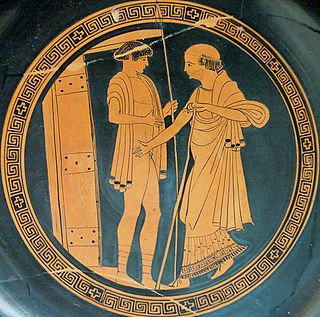 W
WThe Achilleis is a lost trilogy by the Athenian dramatist Aeschylus. The three plays that make up the Achilleis exist today only in fragments, but aspects of their overall content can be reconstructed with reasonable certainty. Like the Oresteia which forms "a narratively connected unit with a continuous plot," the trilogy had a unified focus, presumably treating the story of Achilles at Troy in a version comparable to the plot of the latter two-thirds of the Iliad. In the Myrmidons, Achilles' refusal to fight after his quarrel with Agamemnon led to the death of Patroclus. The title of the play traditionally placed second in the trilogy is the Nereids. The chorus was thus a group of Nereids, and the subject of the play involved Achilles and his Nereid mother Thetis, probably her mourning his imminent death and the acquisition of his new arms. In the Phrygians or Ransom of Hector, Priam and a chorus of Phrygians sought to retrieve Hector's body from the still wroth Achilles.
 W
WThe Suppliants, also called The Suppliant Maidens, The Suppliant Women, or Supplices is a play by Aeschylus. It was probably first performed "only a few years previous to the Orestea, which was brought out 458 BC." It seems to be the first play in a tetralogy, sometimes referred to as the Danaid Tetralogy, which probably included the lost plays The Egyptians, and The Daughters of Danaus, and the satyr play Amymone. It was long thought to be the earliest surviving play by Aeschylus due to the relatively anachronistic function of the chorus as the protagonist of the drama. However, evidence discovered in the mid-20th century shows it one of Aeschylus' last plays, definitely after The Persians and possibly after Seven Against Thebes."Those at least who judge by the style, the simplicity of the plot, the paucity of the characters, and the predominance of choric action, will be reluctant to believe that the Suppliants was composed more than ten years after the Prometheus, Persians, and Seven against Thebes. It may be remarked, though not as an evidence of date, that the play is rather a melodrama than a tragedy. It ends happily, and has no other claim to the latter title than from the pathos excited and sustained by the helpless condition of the fugitive maidens in a foreign land. On the whole, it is rather a good play; and though it has obtained a bad name among scholars on the score of its many corruptions, yet there is a grace and a dignity in the choruses, and a general tenderness, virtue, and artlessness in the characters, that impart a very pleasing tone to the whole composition."
 W
WThe Amycos Satyrykos is a fragmentary satyr play by the fifth-century BCE Athenian dramatist Sophocles.
 W
WThe Suppliants, also called The Suppliant Maidens, The Suppliant Women, or Supplices is a play by Aeschylus. It was probably first performed "only a few years previous to the Orestea, which was brought out 458 BC." It seems to be the first play in a tetralogy, sometimes referred to as the Danaid Tetralogy, which probably included the lost plays The Egyptians, and The Daughters of Danaus, and the satyr play Amymone. It was long thought to be the earliest surviving play by Aeschylus due to the relatively anachronistic function of the chorus as the protagonist of the drama. However, evidence discovered in the mid-20th century shows it one of Aeschylus' last plays, definitely after The Persians and possibly after Seven Against Thebes."Those at least who judge by the style, the simplicity of the plot, the paucity of the characters, and the predominance of choric action, will be reluctant to believe that the Suppliants was composed more than ten years after the Prometheus, Persians, and Seven against Thebes. It may be remarked, though not as an evidence of date, that the play is rather a melodrama than a tragedy. It ends happily, and has no other claim to the latter title than from the pathos excited and sustained by the helpless condition of the fugitive maidens in a foreign land. On the whole, it is rather a good play; and though it has obtained a bad name among scholars on the score of its many corruptions, yet there is a grace and a dignity in the choruses, and a general tenderness, virtue, and artlessness in the characters, that impart a very pleasing tone to the whole composition."
 W
WAndromeda is a lost tragedy written by Euripides, based on the myth of Andromeda and first produced in 412 BC, in a trilogy that also included Euripides' Helen. Andromeda may have been the first depiction on stage of a young man falling in love with a woman. The play has been lost; however, a number of fragments are extant. In addition, a number of ancient sources refer to the play, including several references in plays by Aristophanes.
 W
WAntigone is a play by the Attic dramatist Euripides, which is now lost except for a number of fragments. According to Aristophanes of Byzantium, the plot was similar to that of Sophocles' play Antigone, with three differences. The date of the play is uncertain, but there is evidence that it was written late in Euripides' career, between 420 BCE and 406 BCE.
 W
WThe Suppliants, also called The Suppliant Maidens, The Suppliant Women, or Supplices is a play by Aeschylus. It was probably first performed "only a few years previous to the Orestea, which was brought out 458 BC." It seems to be the first play in a tetralogy, sometimes referred to as the Danaid Tetralogy, which probably included the lost plays The Egyptians, and The Daughters of Danaus, and the satyr play Amymone. It was long thought to be the earliest surviving play by Aeschylus due to the relatively anachronistic function of the chorus as the protagonist of the drama. However, evidence discovered in the mid-20th century shows it one of Aeschylus' last plays, definitely after The Persians and possibly after Seven Against Thebes."Those at least who judge by the style, the simplicity of the plot, the paucity of the characters, and the predominance of choric action, will be reluctant to believe that the Suppliants was composed more than ten years after the Prometheus, Persians, and Seven against Thebes. It may be remarked, though not as an evidence of date, that the play is rather a melodrama than a tragedy. It ends happily, and has no other claim to the latter title than from the pathos excited and sustained by the helpless condition of the fugitive maidens in a foreign land. On the whole, it is rather a good play; and though it has obtained a bad name among scholars on the score of its many corruptions, yet there is a grace and a dignity in the choruses, and a general tenderness, virtue, and artlessness in the characters, that impart a very pleasing tone to the whole composition."
 W
WThe Suppliants, also called The Suppliant Maidens, The Suppliant Women, or Supplices is a play by Aeschylus. It was probably first performed "only a few years previous to the Orestea, which was brought out 458 BC." It seems to be the first play in a tetralogy, sometimes referred to as the Danaid Tetralogy, which probably included the lost plays The Egyptians, and The Daughters of Danaus, and the satyr play Amymone. It was long thought to be the earliest surviving play by Aeschylus due to the relatively anachronistic function of the chorus as the protagonist of the drama. However, evidence discovered in the mid-20th century shows it one of Aeschylus' last plays, definitely after The Persians and possibly after Seven Against Thebes."Those at least who judge by the style, the simplicity of the plot, the paucity of the characters, and the predominance of choric action, will be reluctant to believe that the Suppliants was composed more than ten years after the Prometheus, Persians, and Seven against Thebes. It may be remarked, though not as an evidence of date, that the play is rather a melodrama than a tragedy. It ends happily, and has no other claim to the latter title than from the pathos excited and sustained by the helpless condition of the fugitive maidens in a foreign land. On the whole, it is rather a good play; and though it has obtained a bad name among scholars on the score of its many corruptions, yet there is a grace and a dignity in the choruses, and a general tenderness, virtue, and artlessness in the characters, that impart a very pleasing tone to the whole composition."
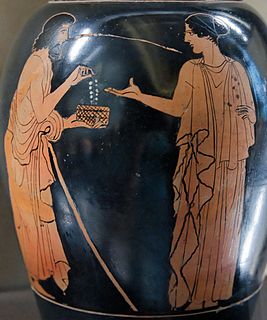 W
WThe Epigoni is an ancient Greek tragedy written by the Greek playwright Sophocles in the 5th century BC and based on Greek mythology.
 W
WThe Epigoni is an ancient Greek tragedy written by the Greek playwright Sophocles in the 5th century BC and based on Greek mythology.
 W
WHippolytus is an Ancient Greek tragedy by Euripides, based on the myth of Hippolytus, son of Theseus. The play was first produced for the City Dionysia of Athens in 428 BC and won first prize as part of a trilogy.
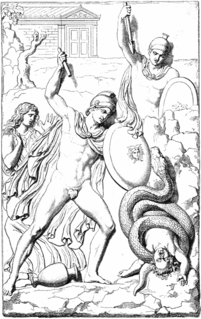 W
WHypsipyle is a partially preserved tragedy by Euripides, about the legend of queen Hypsipyle of Lemnos, daughter of King Thoas. It was one of his last and most elaborate plays. It was performed c. 411–407, along with The Phoenician Women which survives in full, and the lost Antiope.
 W
WSeven Against Thebes is the third play in an Oedipus-themed trilogy produced by Aeschylus in 467 BC. The trilogy is sometimes referred to as the Oedipodea. It concerns the battle between an Argive army led by Polynices and the army of Thebes led by Eteocles and his supporters. The trilogy won the first prize at the City Dionysia. The trilogy's first two plays, Laius and Oedipus, as well as the satyr play Sphinx, are no longer extant.
 W
WLove's Labour's Won is a lost play attributed by contemporaries to William Shakespeare, written before 1598 and published by 1603, though no copies are known to have survived. Scholars dispute whether it is a true lost work, possibly a sequel to Love's Labour's Lost, or an alternative title to a known Shakespeare play.
 W
WThe Achilleis is a lost trilogy by the Athenian dramatist Aeschylus. The three plays that make up the Achilleis exist today only in fragments, but aspects of their overall content can be reconstructed with reasonable certainty. Like the Oresteia which forms "a narratively connected unit with a continuous plot," the trilogy had a unified focus, presumably treating the story of Achilles at Troy in a version comparable to the plot of the latter two-thirds of the Iliad. In the Myrmidons, Achilles' refusal to fight after his quarrel with Agamemnon led to the death of Patroclus. The title of the play traditionally placed second in the trilogy is the Nereids. The chorus was thus a group of Nereids, and the subject of the play involved Achilles and his Nereid mother Thetis, probably her mourning his imminent death and the acquisition of his new arms. In the Phrygians or Ransom of Hector, Priam and a chorus of Phrygians sought to retrieve Hector's body from the still wroth Achilles.
 W
WThe Achilleis is a lost trilogy by the Athenian dramatist Aeschylus. The three plays that make up the Achilleis exist today only in fragments, but aspects of their overall content can be reconstructed with reasonable certainty. Like the Oresteia which forms "a narratively connected unit with a continuous plot," the trilogy had a unified focus, presumably treating the story of Achilles at Troy in a version comparable to the plot of the latter two-thirds of the Iliad. In the Myrmidons, Achilles' refusal to fight after his quarrel with Agamemnon led to the death of Patroclus. The title of the play traditionally placed second in the trilogy is the Nereids. The chorus was thus a group of Nereids, and the subject of the play involved Achilles and his Nereid mother Thetis, probably her mourning his imminent death and the acquisition of his new arms. In the Phrygians or Ransom of Hector, Priam and a chorus of Phrygians sought to retrieve Hector's body from the still wroth Achilles.
 W
WSeven Against Thebes is the third play in an Oedipus-themed trilogy produced by Aeschylus in 467 BC. The trilogy is sometimes referred to as the Oedipodea. It concerns the battle between an Argive army led by Polynices and the army of Thebes led by Eteocles and his supporters. The trilogy won the first prize at the City Dionysia. The trilogy's first two plays, Laius and Oedipus, as well as the satyr play Sphinx, are no longer extant.
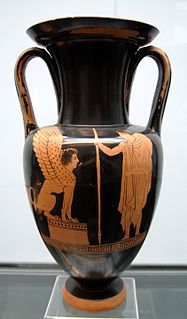 W
WOedipus is a play by the 5th-century BCE Athenian dramatist Euripides. The play is now lost except for some fragments. What survives of the play covers similar ground as Sophocles' acclaimed Oedipus Rex, but scholars and historians have found there are significant differences. In Oedipus Rex, the title character blinds himself upon learning his true parentage, accidentally killing his father and marrying his mother Jocasta. In Euripides' play, however, it appears Oedipus is blinded by a servant of his father Laius, Oedipus' predecessor as king of Thebes. Furthermore, Euripides' play implies Oedipus was blinded before it was known that Laius was his father. Also, while in Sophocles' play Jocasta kills herself, remaining fragments of Euripides' play depict Jocasta as having survived and accompanied Oedipus into exile.
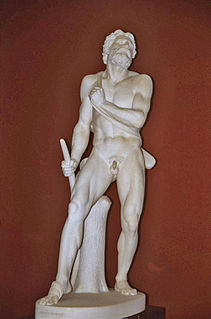 W
WPhiloctetes is a play by the Athenian poet Aeschylus. It was probably first produced during the 470s BCE. It is now lost except for a few fragments. Most of what we know of the plot is from the writings of 1st century orator Dio Chrysostom, who compared the Philoctetes plays of Aeschylus, Euripides and Sophocles.
 W
WPhiloctetes is a tragedy by the Athenian poet Euripides. It was probably first produced in 431 BCE at the Dionysia in a tetralogy that included the extant Medea and was awarded third prize. It is now lost except for a few fragments. Much of what we know of the plot is from the writings of Dio Chrysostom, who compared the Philoctetes plays of Aeschylus, Euripides and Sophocles and also paraphrased the beginning of Euripides' play.
 W
WThe Achilleis is a lost trilogy by the Athenian dramatist Aeschylus. The three plays that make up the Achilleis exist today only in fragments, but aspects of their overall content can be reconstructed with reasonable certainty. Like the Oresteia which forms "a narratively connected unit with a continuous plot," the trilogy had a unified focus, presumably treating the story of Achilles at Troy in a version comparable to the plot of the latter two-thirds of the Iliad. In the Myrmidons, Achilles' refusal to fight after his quarrel with Agamemnon led to the death of Patroclus. The title of the play traditionally placed second in the trilogy is the Nereids. The chorus was thus a group of Nereids, and the subject of the play involved Achilles and his Nereid mother Thetis, probably her mourning his imminent death and the acquisition of his new arms. In the Phrygians or Ransom of Hector, Priam and a chorus of Phrygians sought to retrieve Hector's body from the still wroth Achilles.
 W
WThe Oresteia is a trilogy of Greek tragedies written by Aeschylus in the 5th century BC, concerning the murder of Agamemnon by Clytemnestra, the murder of Clytemnestra by Orestes, the trial of Orestes, the end of the curse on the House of Atreus and the pacification of the Erinyes. The trilogy—consisting of Agamemnon (Ἀγαμέμνων), The Libation Bearers (Χοηφóρoι), and The Eumenides (Εὐμενίδες)—also shows how the Greek gods interacted with the characters and influenced their decisions pertaining to events and disputes. The only extant example of an ancient Greek theatre trilogy, the Oresteia won first prize at the Dionysia festival in 458 BC. The principal themes of the trilogy include the contrast between revenge and justice, as well as the transition from personal vendetta to organized litigation. Oresteia originally included a satyr play, Proteus (Πρωτεύς), following the tragic trilogy, but all except a single line of Proteus has been lost.
 W
WThe Oresteia is a trilogy of Greek tragedies written by Aeschylus in the 5th century BC, concerning the murder of Agamemnon by Clytemnestra, the murder of Clytemnestra by Orestes, the trial of Orestes, the end of the curse on the House of Atreus and the pacification of the Erinyes. The trilogy—consisting of Agamemnon (Ἀγαμέμνων), The Libation Bearers (Χοηφóρoι), and The Eumenides (Εὐμενίδες)—also shows how the Greek gods interacted with the characters and influenced their decisions pertaining to events and disputes. The only extant example of an ancient Greek theatre trilogy, the Oresteia won first prize at the Dionysia festival in 458 BC. The principal themes of the trilogy include the contrast between revenge and justice, as well as the transition from personal vendetta to organized litigation. Oresteia originally included a satyr play, Proteus (Πρωτεύς), following the tragic trilogy, but all except a single line of Proteus has been lost.
 W
WSeven Against Thebes is the third play in an Oedipus-themed trilogy produced by Aeschylus in 467 BC. The trilogy is sometimes referred to as the Oedipodea. It concerns the battle between an Argive army led by Polynices and the army of Thebes led by Eteocles and his supporters. The trilogy won the first prize at the City Dionysia. The trilogy's first two plays, Laius and Oedipus, as well as the satyr play Sphinx, are no longer extant.
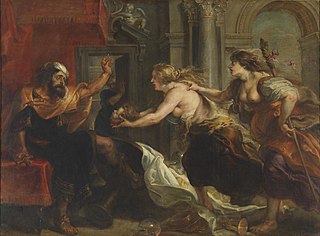 W
WTereus is a lost Greek play by the Athenian poet Sophocles. Although fragments have long been known, the discovery of a synopsis among the Oxyrhynchus Papyri has allowed an attempt at a reconstruction. Although the date that the play was first produced is not known, it is known that it was produced before 414 BCE, because the Greek comedic playwright Aristophanes referenced Tereus in his play The Birds, which was first performed in 414. Thomas B. L. Webster dates the play to near but before 431 BCE, based on circumstantial evidence from a comment Thucydides made in 431 about the need to distinguish between Tereus and the King of Thrace, Teres, which Webster believes was made necessary by the popularity of Sophocles play around this time causing confusion between the two names. Based on references in The Birds it is also known that another Greek playwright, Philocles, had also written a play on the subject of Tereus, and there is evidence both from The Birds and from a scholiast that Sophocles' play came first.